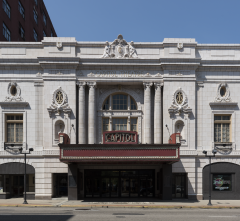Capitol Theatre (Wheeling, WV)
| Capitol Theatre | |
|---|---|
 |
|
| Alternative names | Capitol Music Hall |
| General information | |
| Type | Theatre |
| Location | Wheeling, West Virginia, United States |
| Coordinates | 40°04′12″N 80°43′28″W / 40.07006°N 80.72442°WCoordinates: 40°04′12″N 80°43′28″W / 40.07006°N 80.72442°W |
| Design and construction | |
| Architect | Charles W. Bates |
The Capitol Theatre (also known as the Capitol Music Hall) is the largest theatre in West Virginia and a landmark building in the national historic district of downtown Wheeling. For many years, it has served as the home of Jamboree USA and the Wheeling Symphony Orchestra. Jamboree USA, a Saturday night live country music show broadcast on WWVA 1170 AM from 1926 until 1977, was the second-longest running radio show in the United States, second only to the Grand Ole Opry. The live music show annually drew hundreds of thousands of country music fans to Wheeling, where both local acts and nationally known celebrities such as Johnny Cash, Loretta Lynn, Merle Haggard and Charley Pride would perform.
The Capitol Theatre, designed by architect Charles W. Bates of Wheeling, was built by general contractor R. R. Kitchen at a cost of $1,000,000 and first opened on Thanksgiving day 1928. The theater initially presented movies and stage shows and later concerts by the Wheeling Symphony Society, which moved into the building in 1929. The radio station WWVA staged its first Jamboree show production at the Capitol in 1933. However, the Jamboree moved the venue to the Victoria Theatre after a year at the Capitol and the symphony followed thereafter, feeling that showing movies detracted from the musical performance. After the theater stopped showing movies, the symphony returned to the Capitol in 1961, followed years later in 1969 by the Jamboree, which had tried several different venues since the Capitol, the longest venue being the Virginia Theater. In the subsequent years, the Capitol experienced major success as the Capitol Music Hall. In 1969, WWVA moved its studio to the Capitol building, where it produced and broadcast its Jamboree music shows. The Jamboree, the show later recast as Jamboree USA, and the theater was renamed the Capitol Music Hall; it experienced major success and drew supporters from throughout the tri-state area.
...
Wikipedia
